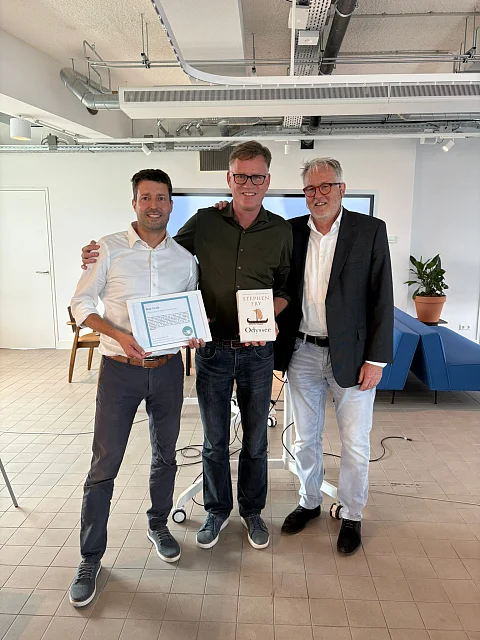Gamechanger Blue Circle Olefins Sees Opportunity for Green Methanol from Waste
18-09-2025
The building blocks of the chemical industry for various products often come from fossil sources. These raw materials are finite and also cause environmental pollution. A technology that has already proven itself on the other side of the world could soon help green the Dutch chemical sector. 'If the big players don’t pick it up, we’ll do it ourselves,'

Blue Circle Olefins receives the certificate for participation in the Green Chemistry Accelerator
The chemistry sector is like a tree where all the leaves represent different products that the industry produces, such as shampoos, paints, and plastics,” begins Ralph Koekkoek, director and founder of Blue Circle Olefins. “The common thread among those leaves is that they are nearly all made from oil. Now you can try to make all the individual leaves on that tree more sustainable. But if the raw material you put into it is not oil, but renewable, then the whole tree will naturally become green.”
Achieving climate gains with existing technologies
The raw materials Koekkoek refers to are olefins, such as ethylene and propylene. These are typically derived from oil and are the most commonly used building blocks in carbon chemistry. However, Koekkoek, who started as a chemist at DSM, wants his company Blue Circle Olefins to derive these building blocks not from oil but from methanol – a process known as methanol-to-olefins. “Methanol is currently primarily seen as fuel for shipping or for the production of sustainable aviation fuel,” says Koekkoek. “As a chemist, I thought: actually, you don’t want to burn that methanol at all. It is much better to keep it in the carbon chain.”
The use of methanol as a building block for chemistry is already a proven technology in China, Koekkoek explains. “China recognized ten or twenty years ago that it had little oil. They decided to gasify coal into methanol and have built their chemical industry on that.”
Producing methanol from waste streams
Koekkoek waited a number of years hoping that chemical giants like Shell, Sabic, and Dow would adopt this technology in the Netherlands. But that did not happen. So, he and his partner and former DSM colleague Reinier Grimbergen decided to bring the technology to the Netherlands themselves. Now, they want to build a methanol-to-olefin plant in the Netherlands. “If the big players won’t pick it up, we’ll do it ourselves. And if we want to make a quick impact, we need to look at existing and proven technologies first.”
Blue Circle intends to largely import the necessary methanol from abroad. Methanol can be produced from waste streams, for example, by gasifying hard-to-recycle plastics or through anaerobic digestion of organic materials. It is even possible to capture CO2 and convert it into methanol in combination with (green) hydrogen, though this technology still needs to prove itself on a large scale.
In addition to importing, the company recently also signed an agreement with waste processor Renewi. The two companies are studying the possibility of opening a plant in Moerdijk where plastic waste is gasified into methanol. Koekkoek states, “Everything that is currently sent to waste incineration could be used for methanol production.”
Future customers are ready
Blue Circle’s plant is ultimately expected to produce 200,000 tons of olefins annually. “This way, we save 800,000 tons of CO2 compared to oil-based olefins.” Koekkoek has also succeeded in making agreements via a coalition of the willing with major manufacturers who will use Blue Circle’s olefins.
While he cannot yet reveal who these future customers are, he does mention that they are willing to pay a premium for the new raw material. “These manufacturers also have their own goals within the circular economy. Our raw materials can help with that. And because the quality and chemical composition of our olefins are the same as virgin raw materials, they can blend our olefins directly into their existing processes.”
Retaining the chemical industry in the Netherlands
However, that is not yet the case. Blue Circle has recently completed a feasibility study and plans to apply for a permit this summer and raise additional funding. The company will then decide whether the plant will be in Limburg's Chemelot or in the Rotterdam port area. “We aim to start construction in 2027. Three years later, we expect to begin our first production.”
Koekkoek is aware of the precarious position in which the Dutch industry finds itself. High energy prices, strict climate measures, and competition from abroad make it difficult for the chemical industry to stay afloat. “In recent months, we have seen a rapid succession of distress letters from industrial parties. Chemical companies are announcing the closure of crackers or reviewing facilities. If we want to retain the chemical industry in the Netherlands, we need to provide chemical companies with a sustainable alternative to oil.”
This article appeared earlier with our media partner Change Inc., author Teun Schröder.
